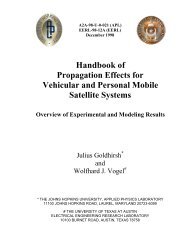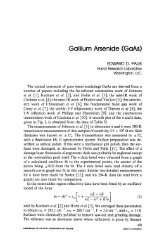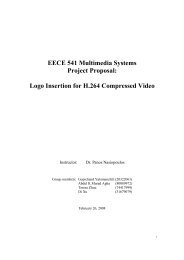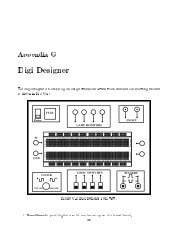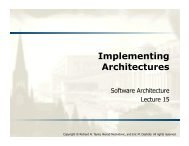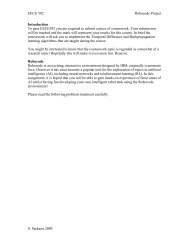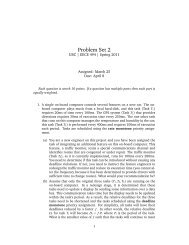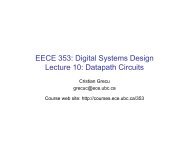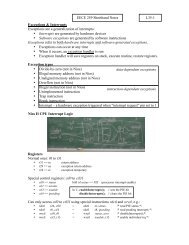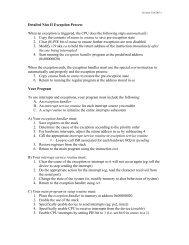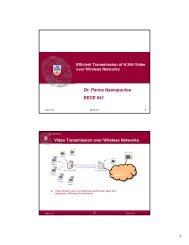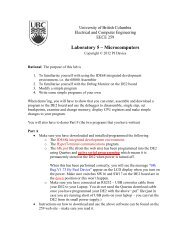EECE 412 Term Project Report - Group 3 - Courses - University of ...
EECE 412 Term Project Report - Group 3 - Courses - University of ...
EECE 412 Term Project Report - Group 3 - Courses - University of ...
Create successful ePaper yourself
Turn your PDF publications into a flip-book with our unique Google optimized e-Paper software.
security system is not feasible due to the variability in the<br />
human factor error. One careless parking attendant is<br />
indeed not a complete representation <strong>of</strong> the behaviour <strong>of</strong> the<br />
other parking attendants. The susceptibility <strong>of</strong> vehicle and<br />
driver recognition through the repeated encounter with the<br />
same parking attendant will also create suspicion in<br />
attempting this exploit. Unless the user decides to only use<br />
the replica pass occasionally, he or she should not attempt<br />
this method because there is a considerable risk <strong>of</strong><br />
identification by the parking attendant.<br />
V. SECURE SYSTEM DESIGN VIOLATIONS<br />
From our analysis <strong>of</strong> the UBC RFID parking system’s<br />
security, we were able to note a few design flaws in the<br />
system. These flaws could potentially increase the<br />
vulnerability risks <strong>of</strong> the system which might lead to future<br />
exploitations.<br />
One <strong>of</strong> the principles <strong>of</strong> designing secure systems that was<br />
violated was the Least Privilege principle. Currently,<br />
FlexPass users are allowed to register as many vehicles as<br />
they wished under their account. The purpose <strong>of</strong> this was to<br />
encourage people to carpool to UBC by sharing a FlexPass.<br />
However, this could backfire in a situation where a user<br />
cloned multiple tags and distributed them to other people.<br />
All the user had to do was ensure that the other people’s<br />
vehicles were registered under his account which could be<br />
easily done via the UBC Parking Services website. By<br />
giving users the ease <strong>of</strong> adding/removing vehicle<br />
registration information from their accounts, UBC Parking<br />
Services has made it easier for users to use duplicate tags as<br />
they did not need to go through any approval procedure<br />
before being allowed to register new vehicles.<br />
The UBC RFID parking system also violated the Fail-Safe<br />
Defaults principle. In one <strong>of</strong> our attacks described in an<br />
earlier section, we successfully tricked a parking attendant<br />
into letting us in and out <strong>of</strong> the parkade using a look-alike<br />
but non-functioning FlexPass. The parking attendant had<br />
found our car registered under the FlexPass and assumed<br />
that it was the system or FlexPass malfunctioning rather<br />
than suspecting that we had malicious intent. If the Fail-<br />
Safe Defaults principle had been followed, the parking<br />
attendant should have denied us exit and instead made us<br />
pay before we were allowed to leave the parkade. By letting<br />
people exit for free on the basis that they owned a FlexPass<br />
but it was malfunctioning, UBC could potentially lose<br />
thousands <strong>of</strong> dollars in revenue if this attack was repeated<br />
frequently.<br />
In addition, the Complete Mediation principle was violated<br />
since at no point during our attacks did they ask for<br />
identification to prove that we were indeed the registered<br />
user <strong>of</strong> the FlexPass. The FlexPass contained no indication<br />
<strong>of</strong> our identity i.e. photo, driver’s license, student number,<br />
or vehicle license plate, which meant that once we had a<br />
hold <strong>of</strong> someone else’s FlexPass, we could do anything<br />
with it. Also, there were no parking attendants at work on<br />
weekends which meant that there was no one monitoring<br />
the cars entering and exiting the parkade. The FlexPass<br />
account on the UBC Parking Services website is also easily<br />
accessible since only the student number and driver’s<br />
license is required to access it. Someone with malicious<br />
intent would have no trouble obtaining such information<br />
and this could lead to an infringement <strong>of</strong> the user’s privacy.<br />
One other principle not followed was the Question<br />
Assumptions principle. UBC Parking Services probably did<br />
not expect anyone to attempt to hack their system.<br />
Therefore, parking attendants were not trained to identify<br />
users with malicious intent like us who used a look-alike<br />
tag instead <strong>of</strong> a real one. UBC Parking Services also had<br />
probably not thought <strong>of</strong> the possibility that the FlexPass<br />
could be forged since the FlexPass did not contain any<br />
special security features such as holograms. Instead, the<br />
FlexPass was merely a readily available RFID tag with a<br />
normal printed sticker on it.<br />
5



